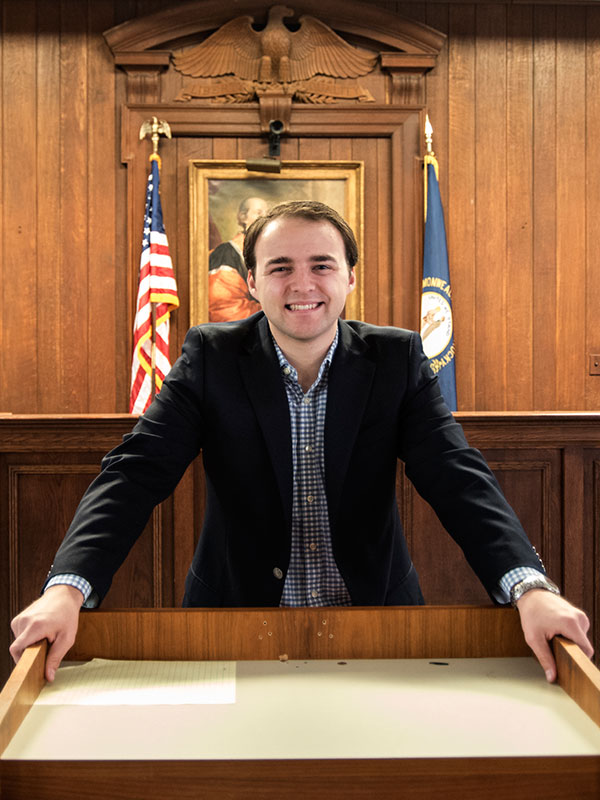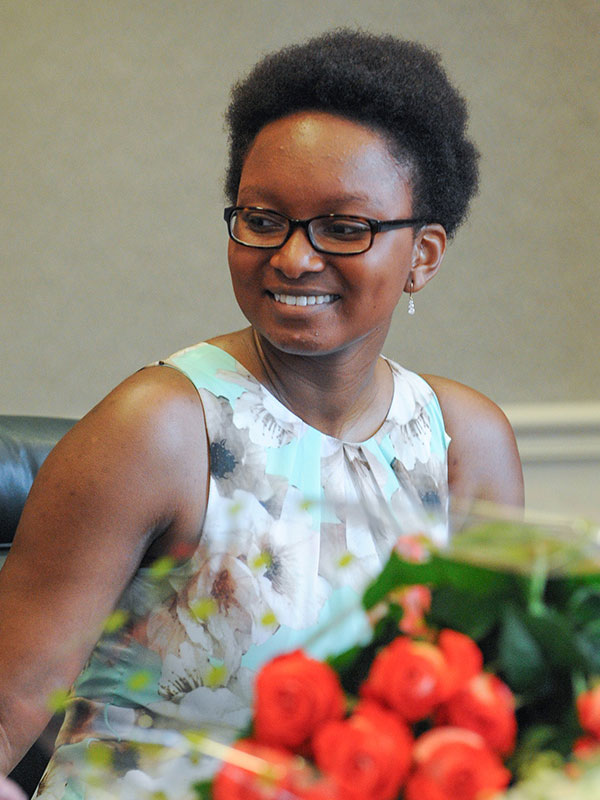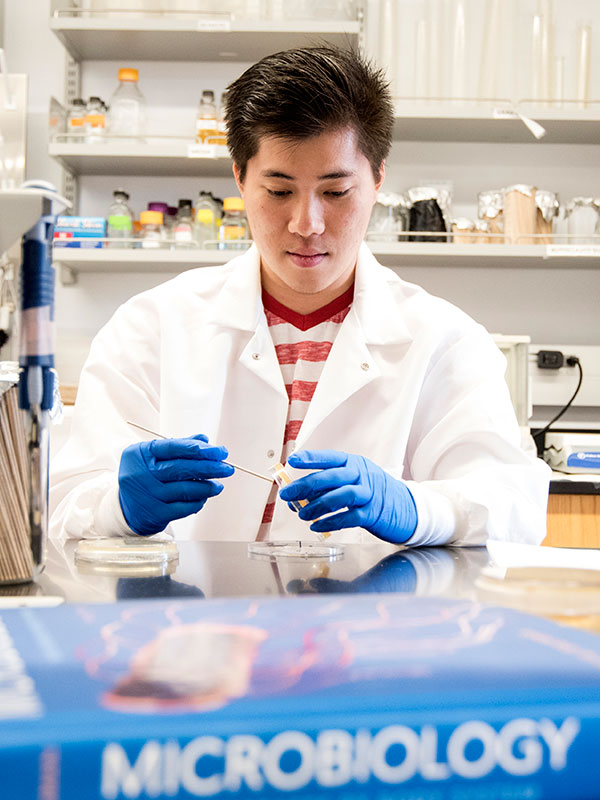An Intellectual Journey: Undergraduates explore a variety of subjects to complete theses
From climate change to the Kentucky legislature, pheromones to foreign investment, and the historical myth of England to high school music programs – seniors in the College of Arts & Sciences complete honors theses on topics across a wide range of academic fields of study.
Twenty-seven students in eleven departments completed undergraduate honors theses in 2016. More than one-third of seniors who completed a thesis worked with multiple departments in the college, most are majoring in more than one discipline, and a few sought mentors outside of their fields of study.
Faculty mentors help students in a variety of ways, from discerning a thesis topic and identifying research tools and methods to working with other faculty members with related areas of expertise and meeting regularly to discuss progress and issues. In addition, the Senior Honors Thesis Committee – composed of nine faculty members representing the three major divisions of the college – oversees the thesis process for the College of Arts & Sciences, reviews thesis proposals, and serves on thesis writers’ oral defense committees.
Some departments require students to complete a thesis to earn graduation honors. Students also get the benefit of pursuing a unique area of their intellectual interest and the opportunity to publish their findings or present at conferences. Read more about a few of the students that completed an undergraduate thesis in the 2015-2016 academic year:

Transporting minds
Stephanie Dooper biked as much as a mode of transportation as for fun growing up in Owensboro. With a father from the Netherlands, the car dependency she observed was distinctly American. So when the opportunity to research and write an undergraduate honors thesis came up, she drew on her 2015 research as an Etscorn scholar in the Netherlands to complete the project, “Cycling Around the Car: An Analysis of America’s Car Culture, Cycling for Transportation in the Netherlands, and an Exploration of Policy Solutions.”
“The priority for people is convenience – that’s why people use cars. But that convenience is creating isolation,” Dooper said. “America’s car culture gives the myth of freedom and individuality, but it stymies communication and community.”
Graduating in May with degrees in political science and liberal studies, a Spanish minor, and a peace and justice conflict transformation certificate, Dooper, like many A&S students, chose to obtain a broad-based education that provides her with a background in a variety of subjects and the ability to engage and excel across disciplines and with people from a variety of backgrounds.

Education without borders
Kevin Grout combined his education and interest in political science and history, subjects he double majored in at UofL, to produce a thesis that looked at historical judicial interpretations of the constitution in two major cases. His thesis, “Habeas Corpus and the Exceptions Clause: Exploring Intergenerational Institutional Struggle,” studied two inter-generational, inter-branch conflicts about one specific clause of the Constitution. Grout found that in each instance, Congress passed a law to respond to internal security threats, and though more than a century separated the two decisions, “they demonstrated a continuation of a single struggle over institutional power and appropriate distribution of power between branches of the federal government,” he wrote.
Grout’s faculty mentor for the project, Prof. Thomas Mackey (History), helped Grout refine his thinking on the topic and oversaw the development of the project, read and edited each section as Grout produced it, and decided when he believed Grout had produced a defensible thesis.
“Because Grout is such a high-achieving student with outstanding academic skills, I ended up doing a lot of cheerleading and encouraging him to keep at the work,” Prof. Mackey said.
The interdisciplinary approach employed by Grout and others in the College of Arts & Sciences is often facilitated by faculty, who encourage students to broadly investigate their academic interests and to develop a collaborative approach to research.
“A good faculty mentor really comes into play with students who are starting fresh in research,” said Sarah Springer, an academic counselor in the Honors program who coordinates the undergraduate theses.

An intellectual journey
Amanda Allen, a political science major and Kentucky’s only 2015 Truman Scholar, worked with Prof. Jasmine Farrier (Political Science) to complete her undergraduate honors thesis, “The Priorities and Accomplishments of Kentucky Legislators: Is There a Gender Difference?,” which uses Kentucky as a case study of gender differences in the policy priorities and perceptions of accomplishments of state legislators.
Prof. Farrier served on the Senior Honors Thesis Committee for three years and led the committee in the 2015-2016 academic year.
“The undergraduate thesis is an intellectual journey for students,” Prof. Farrier said. “It refines the mind and develops critical thinking skills. It takes luck, persistence, and ingenuity in addition to research skills.
“Amanda was the most intelligent person in a room of three professors during her thesis defense, and that is the magic of performing individual research.”

Learning for the future
Steve Tran, a biology major, was the first to admit that writing an undergraduate thesis was “no walk in the park.” Tran’s thesis, “Antibiotic Resistant Bacteria in Natural Environments within Kentucky,” involved extensive laboratory research and an expansive overview of scientific literature on the subject, in addition to a considerable amount of review and editing with his faculty mentor, Prof. Debbie Yoder-Himes (Biology).
As a freshman, Tran had no desire to spend his time in a lab and he had no lab experience. But as his undergraduate education progressed he realized hands-on work was exactly what he most enjoyed. His desire to go to medical school cemented that interest, and completing an undergraduate thesis gave him a leg up in the application process.
“Completing an undergraduate thesis gives students a degree of autonomy that can act as a bridge to professional environments or academia,” Dr. Yoder-Himes said. “Our graduates need not only research and writing expertise, but the critical thinking skills and confidence to work on a difficult project from start to finish, and to use their liberal arts education to excel beyond their undergraduate experience.”
Student Theses
| NAME | MAJOR | PROJECT TITLE |
|---|---|---|
| Simra Ahmed | Biology | Bipolar Cell Dendritic Morphology Analysis in Mice with Model Retinitis Pigmentosa |
| Amanda Allen | Comm/Pols BA | The Priorities and Accomplishments of Kentucky Legislators: Is There a Gender Difference? |
| Katlyn Brumfield | 2D/Art Hist | A World in Flux: Envisioning Climate Change from an Ecocentric Perspective |
| Christopher Burns | Hist BA | Divest Now! The Student Divestment Campaign at the University of Louisville: A Crusade for Equality |
| Zachary Dickinson | Biol BS C/P | The Effect of Interspecies Signaling on Stenotrophomonas maltophilia Growth |
| Stephanie Dooper | Pols/LBST BA | Cycling Around the Car: An Analysis of America’s Car Culture, Cycling for Transportation in the Netherlands, and an Exploration of Policy Solutions |
| Jacob Edmisson | Biol BS C/P | Filifactor alocis, a newly appreciated oral pathogen, fails to induce the respiratory burst response of human neutrophils |
| Hannah Gardner | Psyc | The Effects of Perceived Enjoyable Activities on Cognition in Late-Life |
| Kevin Grout | Hist/Pols BA | Habeas Corpus and the Exceptions Clause: Exploring Intergenerational Institutional Struggle |
| Moriah Horn | Psyc BA | Lung Cancer-Related Emotional Growth: The Role of Coping Styles and Prior Trauma |
| Andrew Knight | Chem BS Biochem | Characterization of Plethodontid TIMP-like Protein (PTP) and its Role in Tissue Remodeling During Pheromone Gland Development |
| Laura Krauser | Geog/Hist | The State of Tobacco: A Remote Sensing Approach to Understanding Tobacco Crop Production in Kentucky |
| Asim Mohiuddin | Biol/Psyc BA | Effects of Talker Variability on Spectral Contrast Effects |
| Philip Moore | Econ (Business)/Pols BA | A Survey of the Cuban Government’s Prospects of Attracting Foreign Direct Investment |
| Adria Neal | Pols BA | Obergefell v. Hodges and Support for Same-Sex Marriage: Changes in National and State Public Opinion |
| Laura Patterson | Anth BA | WHITENESS IN CONTEMPORARY FEMINIST CAMPAIGNS: FREE THE NIPPLE |
| Jessica Ruikka | Chem BA | The Western Diet's Negative Impact on the Health of the Pacific Islands |
| Andrew Segal | Pols BS Law/PP | High School Music Program Participation and Subsequent Strength of the Local Music Economy |
| Jacqueline Sippel | Biol BS C/P | An Investigation into the Adiponectin Receptor Levels in Cardiac, Liver and Skeletal Muscle of Mature Rats |
| Natalie Smith | English/Pols BA | King Arthur and the Historical Myth of England: A Child’s Guide to Nationalism and Identity in the Victorian Era |
| Chad Stephens | Chem BS Biochem/Biol BS C/P | Evaluating the role that a putative FXIII binding site plays in the reactivity of three glutamines within the coagulation substrate Fibrinogen Aα (233-425) |
| Steve Tran | Biol BS C/P | Antibiotic Resistant Bacteria in Natural Environments within Kentucky |
| Paige Wilson | Biol BS Ecol | Movement Patterns of the Cave Salamander (Eurycea lucifuga) in Sauerkraut Cave, Kentucky |
| James-Dean Woods | Biology/Psyc BA | Habitat Effects on Blood Adiponectin Isoforms in Black Bears |
| Heegook Yeo | Biology BS C/P | Role of Dietary Fatty Acids in Liver Injury Caused by Vinyl Chloride Metabolites in Mice |
| Wenyuan Yin | Biology BA | SYNDECAN-1 TAGGED LIPOSOMES AS A THERANOSTIC NANOPARTICLE FOR PANCREATIC ADENOCARCINOMA |
